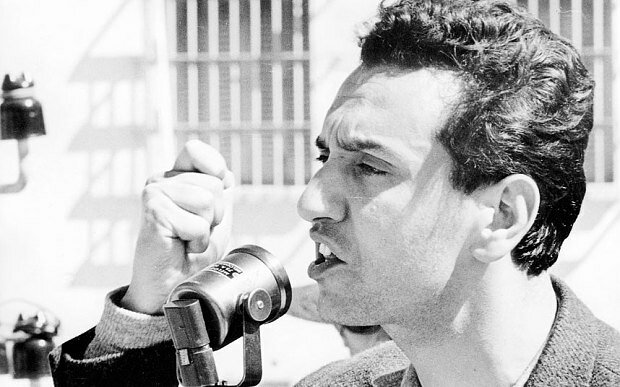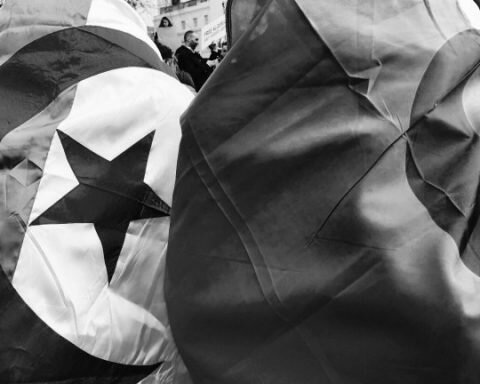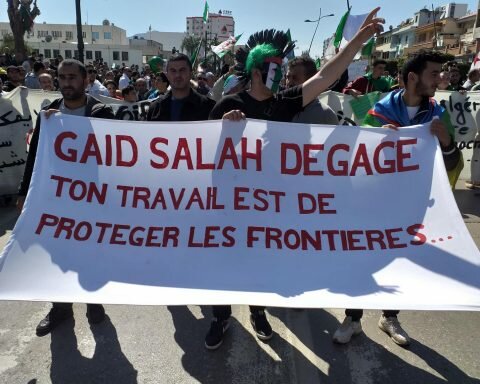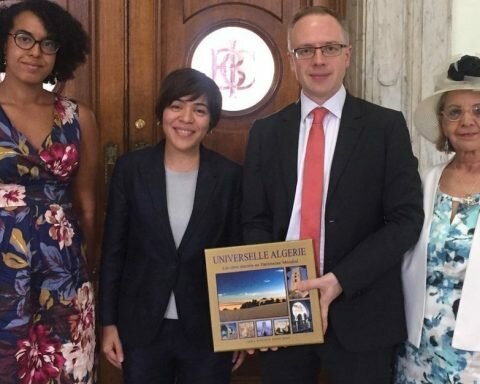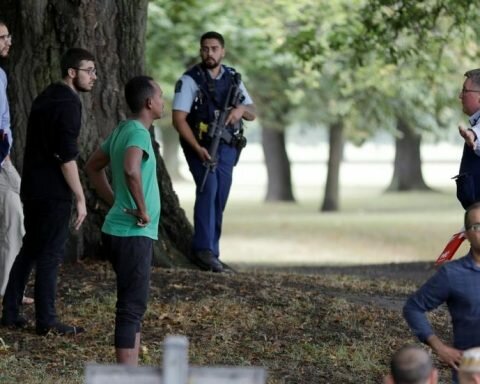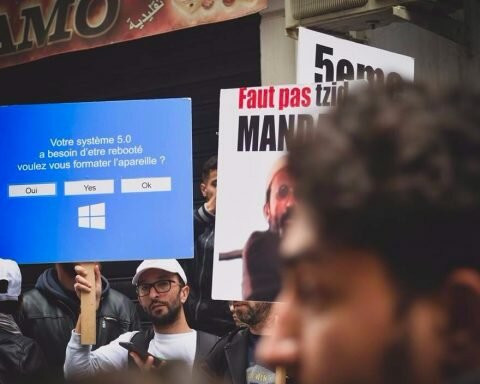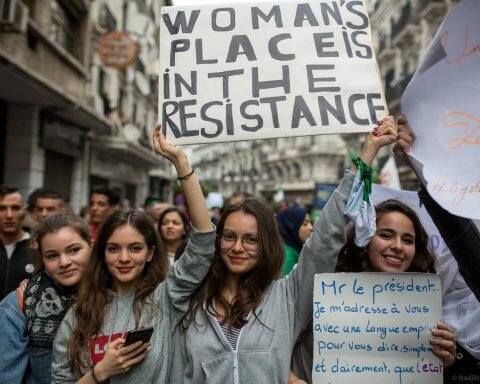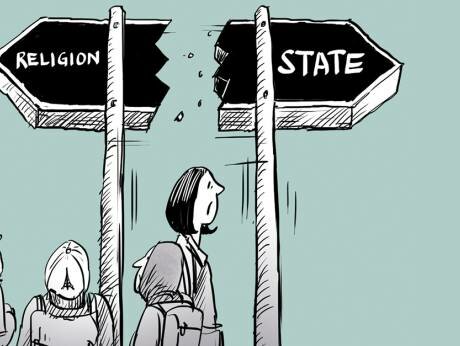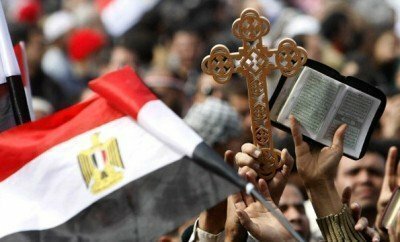No doubt Hocine Ait Ahmed is at last relieved in his tomb now that his people have broken the wall of fear and started to stand as one man in the face of the shameless robbers of Algeria’s independence. Some of the people’s slogans such as “for the advent of a second republic”, “a constituent assembly” were endeared creeds of Da L’Hocine. Many of his wishes are outspoken by youths, women, children, and adults in the streets of the 48 departments of the country.
The peaceful demonstrations of February 22nd, March 1st, 8th, 15th, 22nd… remind us of the march of January 2nd1992 during which Ait Ahmed called to oppose the Manichean proposition of the authorities and the Islamic opposition. “Neither a fundamentalist republic, nor a police state” was the major motto that was shouted by the tens of thousands of demonstrators who occupied the streets of Algiers then. There were youths in great numbers, adults, children and old people. There were shouts, songs, and joys too. Ait Ahmed was able to gather thousands of people to refute the fatalistic stance that prevailed then.
From 1948 till his death in December 2015, the little son of Cheikh Mohand OulHocine ceaselessly battled to free the Algerians from the shackles of colonialism which paved the way to neocolonialism by beheading the sincere leaders of the Algerian revolution, Amirouche, Ben Boulaid, Abane, Ben M’hidi, to name but a few, and infiltrating the ALN with the DAF[1]and thus enthroning its supporters at the head of the newly independent state.
Unlike Didouche Mourad and Ben Boulaid, two of the nine revolutionaries who initiated the revolution through the foundation of the CRUA, Ait Ahmed owed his life to the first airplane hijack in history when in October 1956 the French Air force compelled the plane aboard which was Ait Ahmed along five FLN leaders, namely Boudiaf, Ben Bella, Khider and Lacheraf, to land in Algiers. All of them were imprisoned until July 1962. After the independence, Mohamed Khider was assassinated in January 1967 in Spain, Boudiaf became the first president assassinated in Algeria, in 1992 in Annaba while the two former chiefs of the OS, viz. Ait Ahmed and Ben Bella knew diverse destinies, and diverged more than they converged.
Ben Bella became Algeria’s first president in September 1963. Ait Ahmed “could conceivably have become president [but] he was highly principled”, remarks The Guardian’s journalist Lawrence Joffe in 14 Jan 2016.[2] When the generals offered him to become the president of Algeria in 1992, he refused and declared later that he preferred to be elected mayor in a tiny borough than being appointed president by the French officers. Ait Ahmed presided the first opposition party, the FFS in September 1963. Previously, he was a member of the constituent assembly, which he left after the illegal elaboration of the constitution in the cinema Majestic.
Soon, a process of diabolization of this party led to a brutal repression in the Berber regions and the FFS had to fight and add some 400 martyrs to the million and half martyrs of the war of independence. Imprisoned in Algiers, Ait Ahmed fled and was forced to exile in Switzerland. He re-emerged on the Algerian political stage with the brief democratic parenthesis of the years 1988-1990, but left the country again after the assassination of Boudiaf. He could have become president in 1999, but polling irregularities pushed him and five other candidates to withdraw from the election. Ait Ahmed advocated national reconciliation long before anyone else. On June 16, 1965, he signed accords with president Ben Bella with whom he also signed, in December 1985 an appeal for democracy in Algeria. The warring brothers met him again in 1995 in Saint Egidio for the famous cross-party meeting.
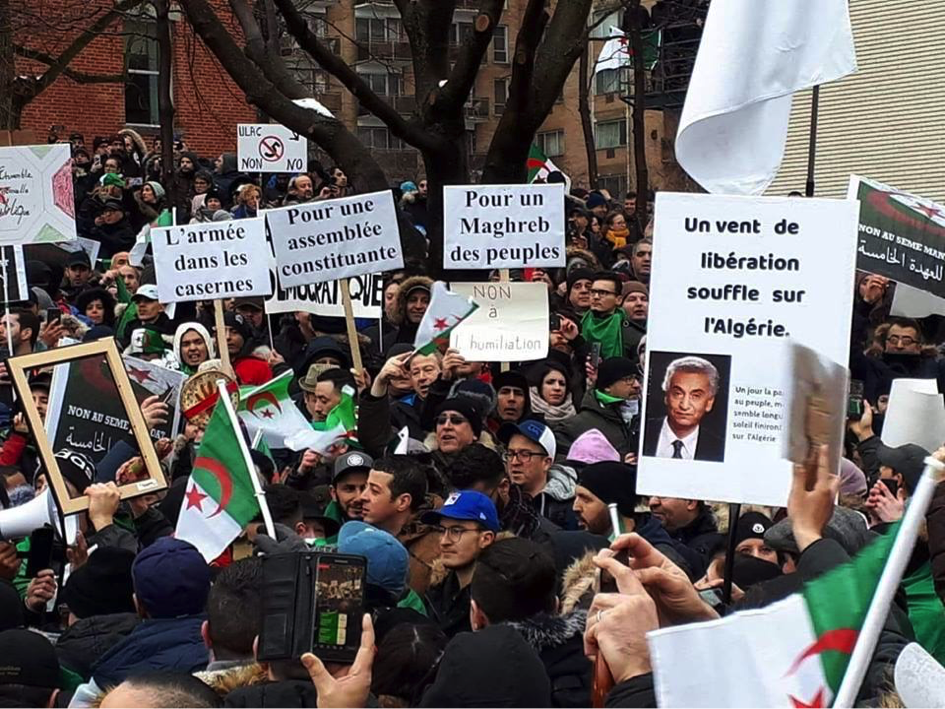
Some of Ait Ahmed’s unforgettable declarations are strikingly topical, and can easily be heard among the millions of people who take control of the streets every day. « le peuple s’est prononcé et c’est lui qui a toujours raison, pour le départ de tous les dirigeants……le peuple sans discernement, considère que tous les dirigeants ont amené le pays dans ce marasme, par conséquent, tous doivent s’en aller… ..», he said in the 1960s. « …Les jeunes ont compris qu’ils ne doivent se remettre à personne, ils doivent eux-mêmes prendre en main leur destinée et ce qui m’importe c’est que précisément, le peuple Algérien, ne se laisse pas faire et décide de revendiquer pacifiquement, d’une façon massive, son droit à l’autodétermination…. ».
It is as if the millions of people who march every Friday heard or read his words. He was a visionary, a man so close to his people that he could feel them and anticipate their needs. « C’est seulement au terme d’une remobilisation citoyenne et politique des algériens que nous pourrons aborder … une refondation institutionnelle, qui remette les droits des citoyens, leur sécurité et leur développement ainsi que ceux du pays au cœur d’une constitution digne de ce nom, par ce que enfin issue d’une assemblée constituante librement élue par des algériens libres. Ceux qui participeront à l’élaboration de ce processus seront les premiers algériens véritablement libres, et ceux qui seront partis avant, ne se seront pas battus pour rien».
Ait Ahmed did not fight vainly; he is not physically alive, but his ideals have survived and two of the most prominent members of the ‘hirak’ are his disciples.
Ait Ahmed never became the president of Algeria, but had presidential funerals. He was buried in his village by millions of people. He is the missing president who would have given Algeria its true independence.
[1]Déserteurs de l’armée française constitués de sous-officiers et officiers dont les parents étaient des notables, caids et bachaghas. Ces déserteurs rejoignirent l’ALN et l’armée des frontières en masse entre 1956 et 1961 pour
[2]https://www.theguardian.com/world/2016/jan/14/hocine-ait-ahmed

